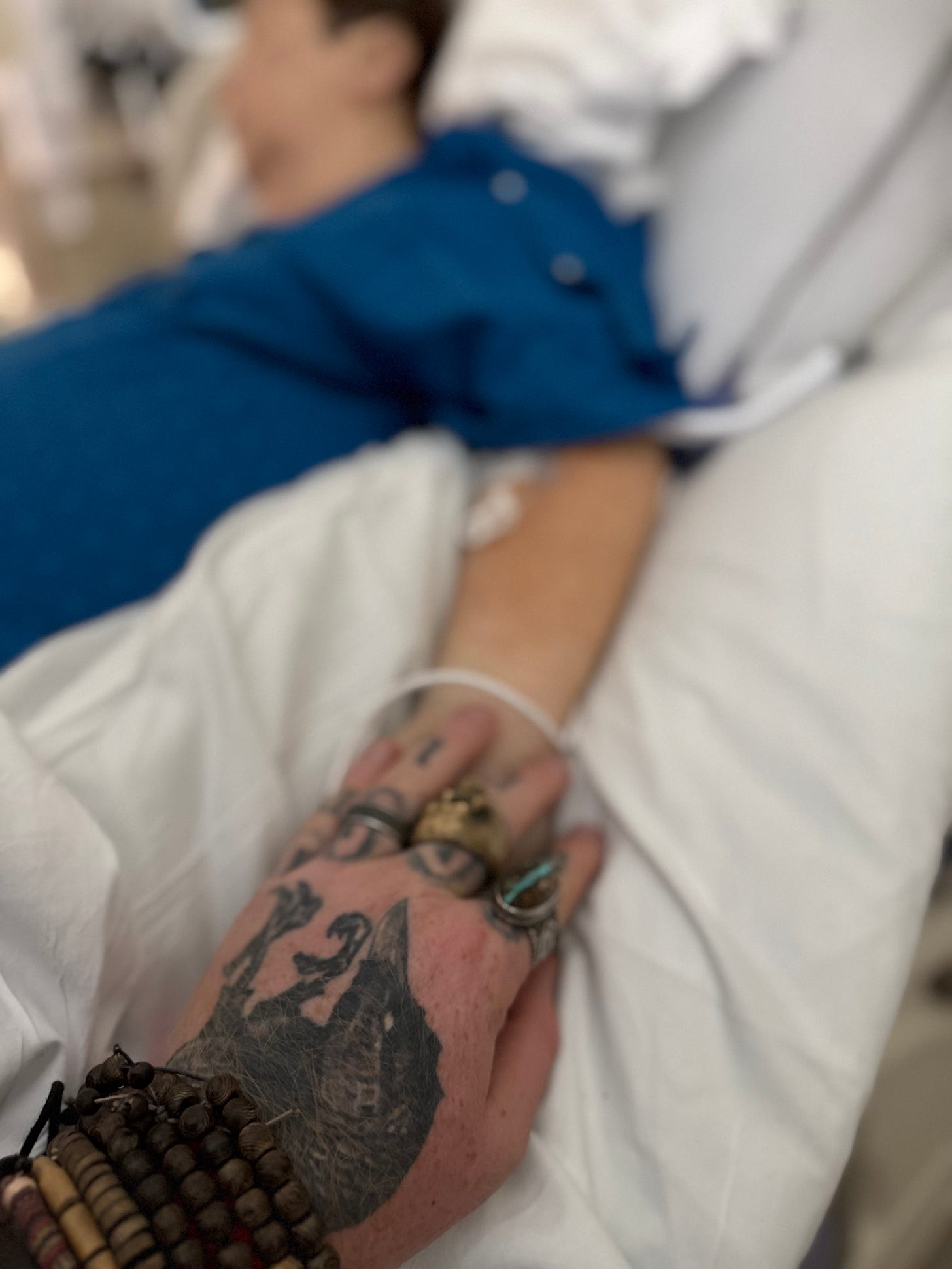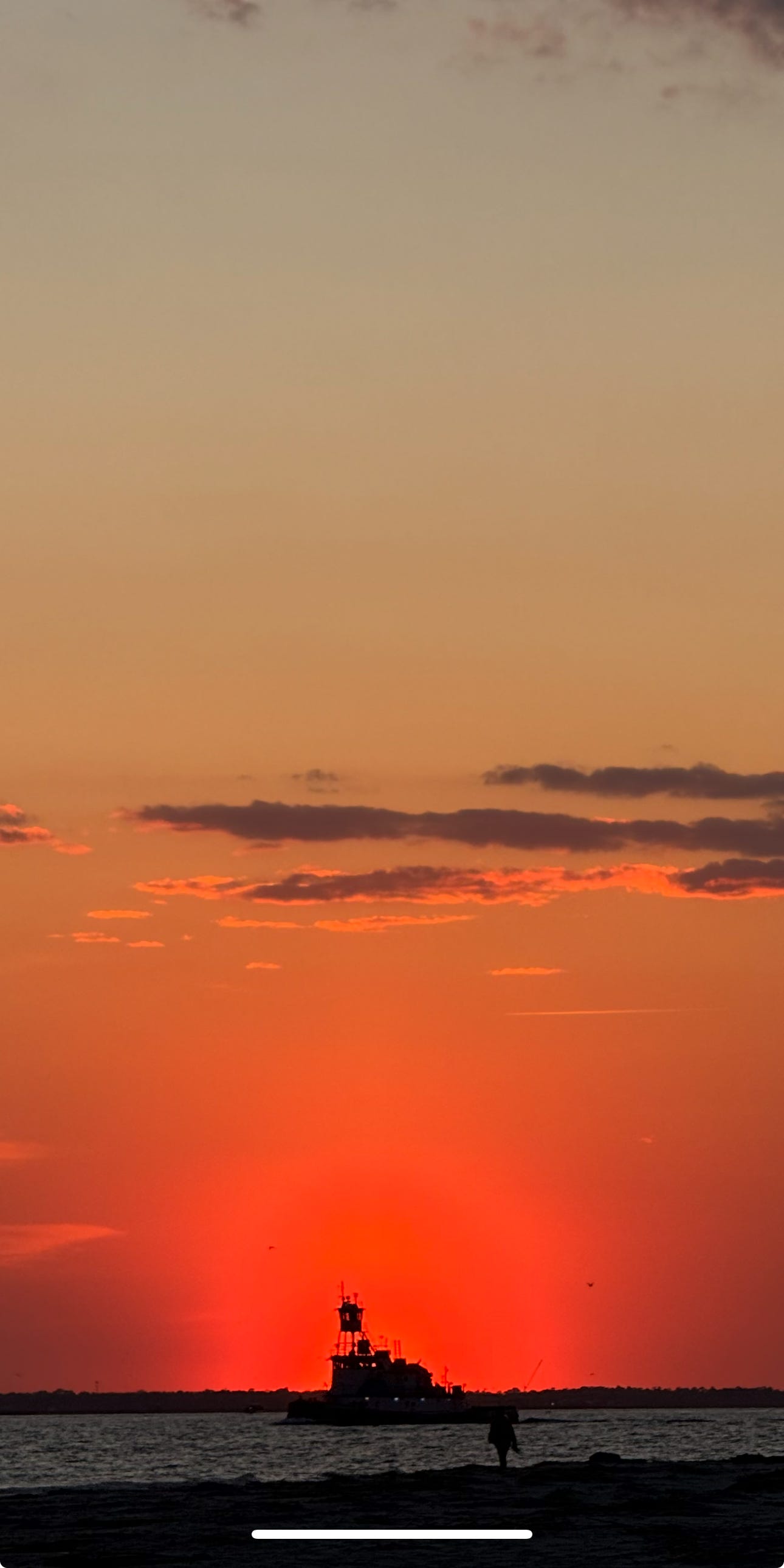Lying beside my mother’s still body, singing her toward her next great journey beyond this life, I felt the slow turning of something ancient. Not tragic—though there was sorrow—but older and more fundamental. The air held a kind of silence so rare, once you’ve felt it, you recognize it forever.
A threshold. A doorway. An invitation.
Two years earlier, my father had died like a lightning strike. No warning. Just a rupture across the sky of my life. Suddenly he was gone.
What followed was not a tidy grief. It was a wild and ungovernable landscape. Grief, I learned, is not just an emotion. It’s a terrain. And you must walk it. Barefoot, often. Alone, mostly. And if you’re lucky, if you’re paying attention, with a a song rising from your heart.
In the space between my parents’ deaths, I became someone else—not in the way of reinvention, but revelation. As if the scaffolding of my life had collapsed and I finally saw what had always been underneath. My response to the enormity of pain was to begin to make things—not to distract from the pain, but to stay with it. To name it. To write something permanent from the shifting sand.
You can’t outrun loss.
You can’t avoid heartbreak.
You can’t silence suffering.
You can’t choose what gets taken.
You can’t erase the pain.
You can’t stop the ache.
But grief is not a detour to life.
Grief invites you to reach deeper.
Let’s be clear: There is no romance in loss. No poetry in watching someone you love dies or disappears. But there is clarity. There is the fire that comes after the storm has leveled the house. You realize you never needed walls. You needed the open sky.
Life is in the breaking. The unraveling.
The falling apart of the illusions you thought would save you. We create our way through despair when we decide to begin, again, anyway.
The grieving of both my parent’s lives stripped me of certainty. But it gave me back the sacred. It returned me to what cannot be touched by death—the part of me that makes, that sings, that watches the hummingbird spiral and writes it down because it matters.
We live in a time of crisis
Society is, as Norman Mailer said, growing duller, less interesting. In part this is because we fail to sit with grief, or the untidy places of our heart. We source out silence and stillness to fury and sound. We process our deep emotions with thinking machines that cannot feel, that cannot be kind to the chaos of our heart. We replace our longing with scrolling and content, our ache with algorithms.
We numb the trembling questions at the center of our lives with curated distractions and dopamine loops. What once required a walk in the woods or a pen to paper—what once demanded solitude, surrender, and a kind of sacred waiting—is now outsourced to speed, performance, and reaction. Get the fix. Fix the hurt.
We have forgotten that creativity is presence and not a product. That it comes not from mastery, but from mystery. That this presence asks us to feel—to fully inhabit the grief, the hunger, the awe, the anger. To live there for a while. To not rush through the silence but to trust it. Not to cling to the hope of solutions but the salve of simply being with reality as is. To let what is unresolved remain that way.
Creativity, real creativity, is born from this mess. From the dark soil of sorrow, the belly of bewilderment. It does not bloom because we command it—it arrives like weather, like grace, like a memory you didn’t know you were carrying. And if we are not listening—if we are not soft enough to receive it—it slips away.
We are not in crisis because we lack ideas.
We are in crisis because we no longer know how to attend to our sorrow.
You can't prevent pain.
But you can shape it.
You can string it into sentences.
Creativity is how you shape from the wreckage. When you gather what’s left and make something no one can take. What you make from out of grief is not decoration. It is survival. It is the evidence that you stayed.
Some days you’ll only make a mess.
Some days just a single sentence.
Some days nothing but a breath and a blank page. But even that is part of it. Even that is part of what endures.
Creation is how the body prays when it has no words. It is how the soul says: I’m still here. Creativity, simply defined, is the unique synthesis of authenticity, imagination, and the willingness to take a risk. It isn’t a luxury. It’s a necessity. It’s how we become real to ourselves. How we recover what life has flattened. It’s how we live forward when the old map no longer works.
There is healing that happens when you create. When you say something true aloud for the first time. When you see your thoughts laid out in ink and recognize yourself for the first time in years. When you bear witness to the noise in your mind and suddenly hear, beneath it, the voice that’s been waiting to speak.
You can sing in the language of the heart and say: This was mine. This hurt. But I made something from it.
The small, rebellious act of creation in the middle of the storm. The poem scribbled on a hospital napkin. The song hummed at a gravesite. The garden you plant because you need to believe something still grows.
The world doesn’t remember how you broke.
It remembers what you made from the breaking.
What you make is what survives.
And sometimes, it’s the only thing that does.
We are told to move on. I don’t believe in that. I believe in moving with. With the pain. With the love. With the memory of my mother’s breath slowing beneath my hand and the old hymn I sang her into silence with. She took the song with her. But I kept singing.
Grief is a midwife.
It delivers us to the life we weren’t ready for—
but the one that’s always been waiting.
Current Offering
This month in The Creators Collective we are diving into poetry. Dead Society Poets is the name of the masterclass—and it’s not just about writing poetry, it’s about creating with urgency, with nerve, with the full, untamed voltage of being alive in a world that sometimes feels like it’s already dead.
It’s about waking the parts of you that still feel enough to grieve, that still notice, that still rebel. The poets we’re drawing from—Emily Dickinson, Anne Sexton, Rainer Maria Rilke, D.H. Lawrence, Rimbaud, and others—didn’t write to be understood. They wrote to survive. To speak from the wound and through it. To stitch meaning out of madness and leave behind something more permanent than pain.
This isn’t about performance. This isn’t about MFA-endorsed verse or trying to impress anyone with your metaphors. This is about showing up at the page like it’s a séance or a confessional or a boxing arena. It’s about saying what no one else dares to say, in a voice that belongs only to you.
Every day I’m posting poetry prompts. You’ll be invited to write dangerously. To make something that feels. To remember that art isn’t here to soothe the culture, it’s here to disrupt it.
Because the world doesn’t need more polite poems.
It needs you.
I hope you come along and throw your lot in with the Dead Society Poets. Let’s write like our lives depend on it.
*Along with this class—you receive access to a library of dozens of other creativity masterclasses, prompts, playlists, and resources designed to help you more fully experience this “one wild and precious life.” You also connect to other creators in community who are some of the most inspiring souls I know. Don’t miss this opportunity, or wait on the sidelines, waiting for something to happen. Create yourself.
Also—if you haven’t checked out The Creators Podcast, this is a great time to do so! It features stories of rebels, misfits, outcasts—the ones history buried or burned, or simply forgot—but who still managed to shape the world from the margins. The ones who created not because it was safe, but because it was necessary.
Each episode is a kind of resurrection. We dig into the lives of artists and thinkers who defied convention, who made something immortal in the face of erasure. You’ll hear about exiled poets, strange visionaries, forgotten mystics, and revolutionary women and men who broke every rule and paid the price for it. Their stories are messy, radiant, and often tragic—but always electric.
If you’ve ever felt like you didn’t quite belong, like your voice didn’t fit the mold—this podcast is your permission slip. Your reminder that creation doesn’t come from fitting in. It comes from standing just outside the circle and saying, I see it differently.
New episodes drop every week.
Start with the latest one on the sorcerous poet, Alejandra Pizarnik—or go back and find the one that calls to you.
This isn’t just history.
It’s a map for how to be free.
This is the first newsletter since my mother’s passing. I think of how she would read each one I sent, and prioritize responding, reaching out, engaging, and tuning her world to my own. What a rare and unbelievable gift. One I will miss.
Thanks so much for being a subscriber to this newsletter. For taking the time to go deeper. To pay attention to the world and the undercurrent. To resist the noise and choose the slower, stranger path.
In a time that asks us to scroll past everything, you stayed. You read. You felt. That matters more than you know.






